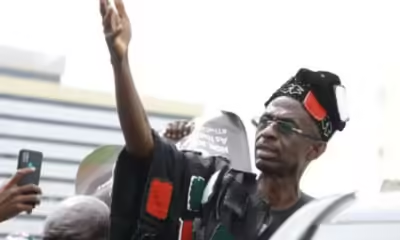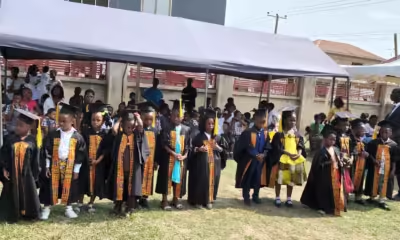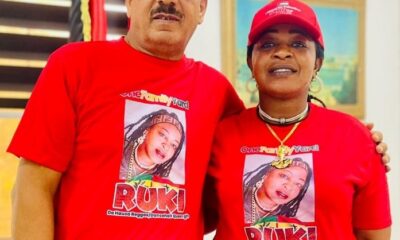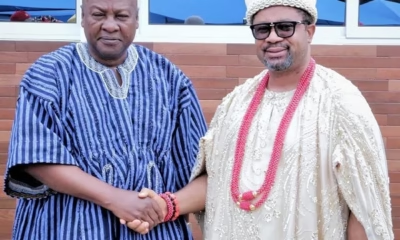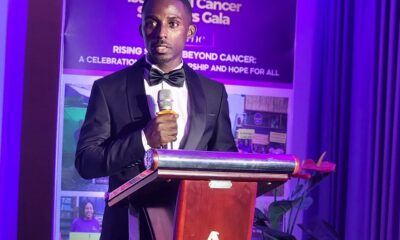News
Finance Minister targets domestic revenue mobilisation for economic revival
Published
2 months agoon

The Finance Minister, Dr Cassiel Ato Baah Forson, has identified enhanced domestic revenue mobilisation as one of the seven priority measures to revive the economy and accelerate the development of the country.
He said Ghana had not performed well in revenue mobilisation compared to its peers and said revenue mobilisation in the past decade had been poor.
Dr Forson stated this in a presentation on the State of the Ghanaian Economy during the opening of the National Economic Dialogue (NED) 2025 in Accra yesterday, which formed part of President John Dramani Mahama’s 120-day social contract commitment.
The Finance Minister mentioned the other priority areas as balancing equity, simplicity and efficiency, pursuing a qualitative fiscal consolidation: ring-fencing growth enhancing spending and social programmes.
The others are ensuring compliance with public financial management and public procurement laws; implementing robust commitment controls to maximise value for money and ensure fiscal discipline; enhancing the efficiency of public spending in social programmes and public infrastructure; phasing out costly, regressive and ineffective subsidies to the energy sector; reforming state-owned enterprises that create contingent liabilities and quasi-fiscal spending (such as COCOBOD and Electricity Company of Ghana); and strengthening Ghana’s fiscal framework by redesigning the fiscal rule to enhance automatic stabilisers.
The two-day programme is on the theme “Resetting Ghana: Building the Economy
We Want Together.”
It is being attended by government officials, policy makers, business leaders, Members of Parliament, members of the diplomatic corps, development partners, representatives of banking, finance and insurance organisations, civil society organisations, academic and research experts, women and youth group representatives, the clergy, traditional leaders, community representatives, and grass-roots Ghanaian citizens, to discuss measures to foster inclusive economic growth and national development.
The objective of the dialogue is to communicate the true state of Ghana’s economy to stakeholders and the people of Ghana, develop a homegrown fiscal consideration programme to guide the national budget and highlight key structural reforms and policy priorities essential for resetting the economy.
The dialogue centres on six thematic areas, namely Growth with Diversification Export Competitiveness Productivity Technology, and Human Well-being(DEPTH): Achieving Inclusive and Sustainable Economic Transformation; Private Sector-led Growth; Unlocking the Full Potential of Businesses; Infrastructure Development: Addressing the Deficit for Economic Transformation; Structural and Policy Reforms; Strengthening Key Sector for Growth and Good Governance; and Accountability and Anti-Corruption Measures.
Dr Forson said the government was ready to transform the economy to promote sustainable and inclusive economic growth.
“There is an urgent need for comprehensive policies and institutional reforms that enhance productivity, improve the quality of infrastructure and services, and elevate human capital and workforce skills. These reforms have the potential of transforming Ghana within a generation, tripling its per capita income by 2050,” Dr Forson stated.
The Finance Minister said the objective of the government was to move from an economy based on factor accumulation and natural resource depletion to one driven by productivity and human capital.
Touching on the National Economic Dialogue, Dr Forson said it was an “Opportunity to reflect on our economic reality, address pressing challenges, and chart a course towards a more prosperous future for all our citizens.”
The Chairman of the Planning Committee of NED 2025, Dr Ishmael Yamson, said the task of resetting Ghana could not be delayed.
He said the country needed home-grown policies to address the myriad of socio-economic challenges facing the country.
Dr Yamson said there was the need to transform the economy to generate jobs and bring hope to the teeming unemployed youth, saying Ghanaians were tired of poverty and hardship.
The Chairman of the NED lauded the President for hosting the programme and suggested that it should be an annual programme to dialogue with the private sector and key stakeholders to discuss measures to prop up the economy.
BY KINGSLEY ASARE
& JULIUS PETETSI
You may like
Islamic Position on Illicit Drugs (Part 2)


Two suspect arrested for murder of Tahiru Zinabu


Female Members of Parliament Undergo Affirmative Action Training in Ada


Abla Dzifa Gomashie launches Fleet Pool Management Services


Biography of Pope Leo XIV, born Robert Francis Prevost


Matteo Bruni: Pope Leo XIV’s name choice highlights the Church’s mission

The Central North Regional Police Command, has arrested two suspects in connection with the murder of , Tahiru Zenabu, at Kokoase, a suburb of Twifo Praso in the Central Region.
Tahiru Zenabu, was found dead in her room on April 3, 2025 with a cloth tied around her neck and blood stains on her hands at Kokoase, a suburb of Twifo Praso in the Central Region.
The suspects, identified as Isaac Arhin and Richard Armah, were arrested on May 5, 2025 at Twifo Aboabo.
Preliminary investigations established that Richard Armah, a mobile phone Repairer and Spinner residing in Twifo Aboabo, was arrested when he used the deceased’s mobile phone to call a friend of the deceased who reported the matter to the police.
Upon interrogation, Richard Armah mentioned suspect Isaac Arhin as his accomplice and he was subsequently arrested. The mobile phone has since been retrieved and is in the custody of the Police.
The two accused persons were put before the court on May 7, 2025 and were remanded into police custody to re-appear on May 21, 2025.
News
Female Members of Parliament Undergo Affirmative Action Training in Ada
Published
6 hours agoon
May 9, 2025
A two-day training workshop was organised by the National Commission for Civic Education (NCCE) to sensitise Ghanaian female Members of Parliament (MPs) on the Affirmative Action (AA) Law was held from May 6-7 2025.
The workshop held at the Aqua Safari Resort in Ada aimed at providing the MPs with lobbying skills, advocacy and the necessary tools for the act to be fully enforced.
Madam Kathleen Addy, Chairperson of the NCCE, opening the workshop, said the sensitisation was important for the female MPs to help materialise the benefits envisaged in the law.
Madam Addy said there were a lot of reforms to be made to help more women emerge as parliamentarians, citing Rwanda, where 64 per cent of its parliamentarians are females.
Madam Addy said the AA law must impress upon political parties to reserve a percentage of their parliamentary seats for women, an intervention she believes would make women part of policymaking.
She lamented that Ghana has 50 per cent of its population being women but only 14 per cent of women in Ghana’s parliament are women.
The MPs expressed satisfaction about the workshop, acknowledging that women have always been marginalised and less catered for.
The Minister for Tourism, Culture and Creative Arts, Hon. Ablah Dzifa Gomashie, and MP for Ketu South and a queen mother in the Aflao Traditional Area, said that a female child could equally be raised by her parents to perform tasks of all kinds, rather than segregating duties to be performed with gender identification.
She said aside what biologically identifies us as men and women, and may be our strength levels, every other thing can be done by both genders, adding that countries that have women in leadership are doing better than Ghana.
The MP for Salaga South, Madam Zuwera Mohammed Ibrahimah, added her voice and said the Affirmative Action Law, which was passed and assented to last year, would not be one of the many laws that are not in use.
According to her, female MPs would get themselves acquainted with the law, engage various stakeholders, and then disseminate an action plan to the citizenry to empower and encourage many women to accept leadership positions in the country.

On Monday, May 7, 2025, the Minister of Tourism, Culture and Creative Arts and MP for Ketu South, Hon. Abla Dzifa Gomashie launched the Fleet Pool Management Service (FPMS), a transport service by the Ghana Tourism Development Company (GTDC) that aims to solve the transportation challenges in the tourism sector.
According to Hon. Abla Dzifa Gomashie, the goal of the initiative is to ensure that movement between destinations in Ghana is as enjoyable as the attractions themselves.
She stated that tourism is not just about the sights. It is about the experience, and the experience starts the moment a tourist lands in Ghana. If transportation is poor, we risk losing visitors and damaging our reputation.



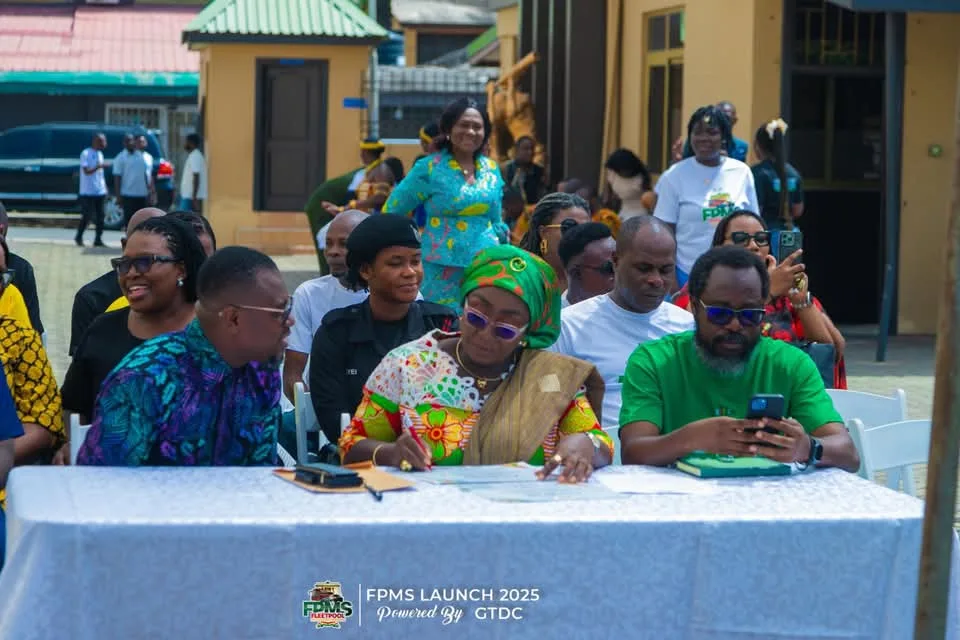

Abla Dzifa Gomashie stressed the need for better connectivity and called on African countries to work together to improve direct flight connections within the continent.
According to her, travelling across Africa is expensive and tiring. We therefore need partnerships with countries that have national carriers to make this easier, she stated.
The Fleet Pool Management Service (FPMS) is designed not just as a short-term strategy, but as a model for long-term transformation.
It will help support better driving standards, compliance with national regulations, and overall growth in the tourism ecosystem.
The minister urged other tourism-related businesses, such as hotels, restaurants, and cultural institutions, to also reflect Ghana’s identity in what they offer by playing Ghanaian music in their hotel lobbies, decorating the place with local art, and serving Ghanaian food in creative ways. She asked hoteliers to let tourists feel the culture at every turn.
Concluding her address, she urged stakeholders to embrace innovation and a spirit of service, which has Ghana’s development at the forefront.
She expressed confidence that, with collective effort, tourism could become a key pillar of the nation’s economic growth.
The Ag. The Chief Executive Officer of the GTDC said the FPMS will use the Private Public Partnership Approach to improve transportation in the tourism sector, with GTDC doing the legwork to get the customers.
To do this, he said the GTDC will ensure that there is a database on drivers to organise tour driving and track to give accurate information to tourists.
Though he acknowledged that collecting data in Ghana is cumbersome and challenging, he said GTDC will support by organising this using a different kind of orientation.
The initiative is a way to position Ghana by helping to overcome the challenges for us to achieve the Black Star Experience.
According to Prof. Kobby Mensah, FPMS is a forward-looking transport network that would ensure a professional system that has a dependable supply system in place.
Islamic Position on Illicit Drugs (Part 2)

Two suspect arrested for murder of Tahiru Zinabu

Female Members of Parliament Undergo Affirmative Action Training in Ada
Trending

 Politics8 months ago
Politics8 months agoVoter Register Discrepancies: NDC to stage nationwide protests against EC

 News9 months ago
News9 months agoArise Royals Montessori School Marks 2nd Graduation.

 Entertainment10 months ago
Entertainment10 months agoGhanaian musician Champions Gaza Peace with New Track

 News5 months ago
News5 months agoKing of Igbo Community in Ghana congratulates Mahama as President-elect of Ghana.

 More9 months ago
More9 months agoYoung people urged to develop their talents

 News10 months ago
News10 months agoCancer Support Network Foundation holds gala

 Entertainment10 months ago
Entertainment10 months agoSteps to receive an official GWR certificate – Details from mother of a Ghanaian record holder

 Tech10 months ago
Tech10 months agoWatch out for sharks: The bizarre history of internet outages













